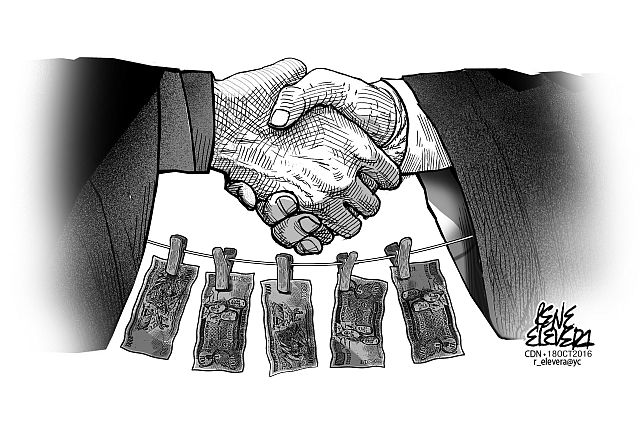
So what else is new about the Social Weather Stations (SWS) survey that showed about 63 percent of Filipino entrepreneurs convinced that corruption is rampant in the country?
The survey results which covered the February to May period this year reminded us of a scene in the 1977 Sidney Sheldon novel “Bloodline” in which one of the top company officials disclosed to the young female protagonist Elizabeth Roffe that one of their employees was caught bribing a top Italian government official.
Shocked on learning about the incident, Elizabeth asked why would one of their employees be involved in bribing government officials to which the board member, an Italian womanizer named Ivo Palazzi, replied bluntly: “So we can do business with them. It’s a way of life down there.”
The Philippines may not be the most corrupt country in the world, but we won’t be surprised if it ranks right up there — hopefully not in the top 10 — with the worst of the lot.
The survey covered mostly small to medium enterprises which have difficulty accessing loans and funding from government and private financial institutions, as well as big business in manufacturing and retail services.
There’s some good news amid the mostly negative findings of the SWS survey; about 75 percent of business managers expect better conditions for business in the next two years, up slightly from 72 percent last year.
In Cebu, business satisfaction in their local governments, as far as building an investment climate, rose a percentage point to 63 percent from 62 percent last year or slightly lower than the national average of 63 percent.
But the negative results are quite telling; 54 out of 100 respondents perceive there is “corruption” in government, up from 33 percent in a similar survey among Cebuano businessmen in 2012.
About 40 percent of respondent businessmen said they had personal knowledge of corruption in government in their line of business this year, or an increase from 28 percent last year.
And 90 percent of the respondents won’t bother reporting the corruption because they expect that “nothing will come out of it.”
The numbers are quite depressing especially the 90 percent of those who are resigned to the fact that nothing can be done about corruption in government.
Or are they? About 67 percent of the same survey respondents (68 percent in Cebu) believe that government can be run without corruption while 33 percent believe that it is part of how government works. And 73 percent of them don’t agree that they cannot do anything about corruption in government.
The solutions are provided in the survey; best practices in business and government, refusal to pay bribes and knowledge of government laws in transactions.
It’s just up to the citizenry and the Duterte administration to cut down on graft and red tape. It’s not easy but it can be done.

